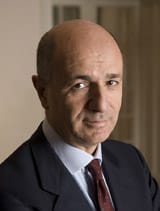The story of modern Greece is quickly becoming a parable that could go down in European lore with the tale of Odysseus, but Greek politicians might not find their way home this time.
After the global financial crisis, Greece, a member of the Eurozone, required assistance. In May 2010, it received its first injection of funding, €110 billion. During the following two years, Greece received additional injections of cash and forgiveness of its debt. These bailouts have put an economic and political strain on the member states of the European Union. Given that the European market accounts for 25 percent to 30 percent of the global economy, markets the world over have felt the stress too.
In November 2011, international analysts feared that Italy—the world’s eighth largest economy—would soon follow Greece. A bailout for Italy, with a gross domestic product (GDP) of more than $2 trillion—as compared with Greece’s GDP of $305 billion—would prove an even greater challenge for Europe and increase turmoil in the world’s financial markets.
New Italian Prime Minister Mario Monti chose a Wharton alumnus to address the problem. He named Corrado Passera, WG’80, as Italy’s minister of development, infrastructure and transport in November 2011 and charged him with righting the Italian economy. One of the most prominent members of Monti’s technocratic cabinet, Passera was selected because of his high-profile past successes and technical skill, and his ascension to this position has been praised by international economists.

Corrado Passera, WG’80, minister of economic development, infrastructure and transport for the government of Italy
Passera has righted a troubled ship before. In 1998, he took on the responsibility of leading the Italian postal service. At the time, the organization was failing. Postal rates were high, it took five days for the average domestic letter to reach its destination, and the system only had two months of cash and substantial debt.
Decreasing the cost of mail by 67.6 percent, Passera was still able to ensure that overnight delivery was increased. Now 80 percent of domestic mail reaches its destination the next day. He computerized the postal service, drastically reduced the postal service’s debt and instituted the single-file customer service line.
After leaving the postal service in 2002, Passera took his expertise and skills to serve as managing director and CEO of a major Italian bank, Intesa Sanpaolo, before being called upon to serve in Monti’s cabinet.
This most recent assignment may prove to be his most challenging. In the month of Passera’s appointment, the jobless rate rose to 30 percent among the young—those 15 to 24 years old—according to the Italian National Institute of Statistics. According to the prime minister, the Italian economy suffers from “insufficient competition, inadequate infrastructure and too much red tape.”
Passera is prepared to tackle these issues and more. Armed with his extensive experience and Wharton knowledge, Passera has taken a long-term and wide view of the issue.
“We cannot keep looking for single things, silver bullets,” he was quoted as saying in the Financial Times. “If you want to build the wide consensus that is needed, we have to share sacrifices and benefits among all the segments of society with a balanced set of actions and with the right mix of austerity and development programs.”
The Long-Term View in Jakarta
Wharton alumnus Dr. Boediono, GrW’79, has also taken a long-term view of the financial downturn. As vice president of the Republic of Indonesia, elected in October 2009, Boediono has not only helped to steer Indonesia through the current crisis, but remains vigilant and is preparing for future downturns. Addressing a CEO Forum in December 2011, Boediono stated, “The government is ready to anticipate any eventuality.”
Boediono has argued that there should be “harmony” between economic and political policy and has sought it in Indonesian policy. He has urged regional partners to do the same.
Addressing trade ministers of the Member States of the Association of Southeast Asian Nations, Boediono said, “We all have to be vigilant and be prepared with national policy responses, as well as regional policy responses and cooperation.”
Boediono and his approach are widely respected. Indonesian President Susilo Bambang Yudhoyono has called Boediono “honest, modest, consistent and tolerant” and stated that Boediono can help “in weathering the economic crisis.”
Certainly, Boediono’s background lends itself to this assertion. Boediono previously served as the governor of Indonesia’s central bank, Indonesia’s coordinating minister for economic affairs and its minister of finance.
Boediono is credited with helping to change Indonesia’s financial system in 2001 and persuading the International Monetary Fund to resume a debt program with the country.
His career successes led the Jakarta Post to call Boediono “one of Indonesia’s most highly respected economic policymakers.”
The strategy that Boediono has helped to implement appears to be working. Since Boediono took office, Indonesia has attracted significantly more foreign direct investment (FDI).
According to the Wall Street Journal Asia, in 2010, FDI expanded by 20 percent, reaching $19.3 billion. In addition, Indonesia’s GDP keeps growing. GDP has expanded by more than 5 percent in seven out of the past eight years. This growth is expected to continue.
It is no coincidence that both Passera and Boediono will lead Wharton’s upcoming Global Alumni Forums. Passera is the chairman of Wharton Global Alumni Forum, Milan, which will take place May 17 and 18. He will give a much-anticipated speech on the morning of Thursday, May 17.
Boediono serves as the honorary chairman of Wharton Global Alumni Forum, Jakarta, which will be held June 22 and 23. Audience members on the morning of Friday, June 22, will surely be listening attentively when the vice president gives his keynote address.
After all, economic policy has taken center stage in today’s domestic and international political debates. On campus, Wharton has made a concerted effort to organize and consolidate its public-policy efforts. Wharton faculty members in Management, Finance, OPIM and other departments, are now seeking to leverage the work they do at Wharton to have a more potent impact on the political sphere, as well as better prepare Wharton students. After testing various models of public-policy instruction throughout the past 30 years, the School has found a new model that suits its students and research pursuits. Wharton has become a haven of fact and rigorous research and an overall resource for policymakers.
And an increasing number of Wharton alumni play a direct role in public policy.
Robert Inman, Wharton’s Richard King Mellon Professor of Finance and Professor and Department Chair of Business & Public Policy, argues that the careers of many Wharton students will cross between private and public organizations. Some career paths will take students to corporations that work with government entities; other students will lead careers that weave between private and public organizations.
Inman estimates that up to 20 percent of the MBA student population has long-term public-policy dreams. The remaining 80 percent shouldn’t ignore public policy issues. From real estate to entrepreneurship, an understanding of public policy is essential for success.
According to Inman, Wharton has demonstrated that it understands this Wharton constituency with its public-policy-focused coursework, which will assist graduates in evaluating the public-policy sphere in an “intellectual, analytical way.” The School is not strictly focused on creating government practitioners.
In addition to coursework focused on the public sphere, Wharton is seeking opportunities to increase students’ exposure to government. The Business & Public Policy department hopes to increase the number of summer internships available in government organizations to both undergraduate and graduate students. In addition, longer-term internships, between one and two years, may also soon become a possibility for students.
While maintaining their primary area of focus, Wharton professors can help to shape government for the better. Wharton faculty members already produce research and advise organizations to help increase efficiency, whether those organizations are private or public companies, nonprofits or government institutions.
Inman, who advises government entities in finance, states that there is no substantive difference between what he does and what another faculty member would do for a private company. The difference only lies in the recipient of this information.
By using skillsets learned through academic prowess in finance, or human resources or management, faculty members and students can help government become more efficient and effective. These efforts help to fulfill the School’s mission.
As Dean Thomas S. Robertson stated, “Since our founding in 1881, Wharton has been dedicated to enhancing social and economic welfare around the world. A renewed commitment to enhancing public policy is merely a natural extension of that founding ethos, and it couldn’t come at a more critical time.”
Our Global Alumni Forums
For nearly 20 years, the Wharton Global Alumni Forums have brought Wharton knowledge to your doorstep.
All told, more than 14,000 Wharton alumni, friends and industry leaders have attended these international events. Notable speakers have included Jacob Wallenberg, W’80, WG’81, chairman of Investor AB of Stockholm; Donald D. Humphreys, WG’76, senior vice president and treasurer of Exxon Mobil Corp.; and Alfredo Carvajal, W’59, former president of Carvajal S.A.
In 1993, 100 people gathered in Manila for the first Forum. Through lecture, discussion and collaboration, guests of the Forum explored pertinent international business topics. This event enabled Wharton alumni and dedicated business professionals to seek answers to questions they faced every day in their careers, as well as debate long-term global issues.
Three years later, the Forum crossed continents, when 150 gathered in London for the first Global Alumni Forum in Europe, Africa and the Middle East.
Finally, in 2000, Latin America hosted its first Global Alumni Forum, as 200 attended the event in Buenos Aires, Argentina.
Each of these three events marked the beginning of Wharton’s growing global outreach. To date, more than 25 different cities on five continents have hosted the Global Alumni Forums, and two more cities—Milan, Italy and Jakarta, Indonesia—will host the Forums in the coming months.
With such the opportunity to gain from the insights of global business luminaries, as well as the venue for networking and collaboration, it is easy to see why the Forums continue to grow in popularity.
Plans are already underway for future Forums. A 2013 Global Alumni Forum will be held in Tokyo from May 24-25, and a 2014 Global Alumni Forum will be held in Panama City. We look forward to seeing you there.



























